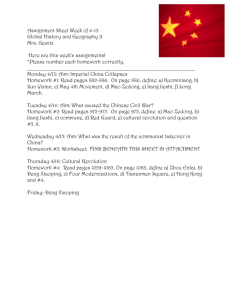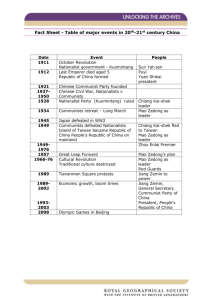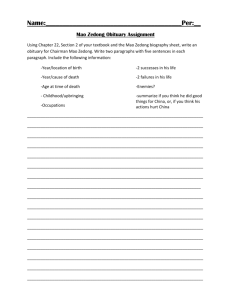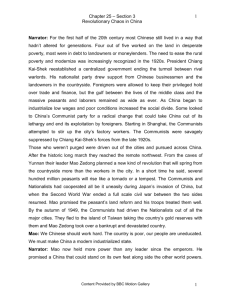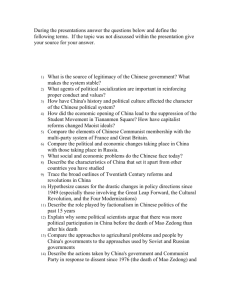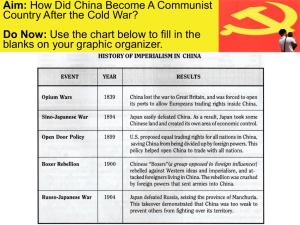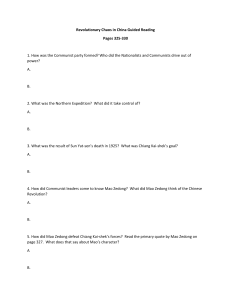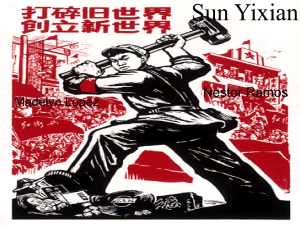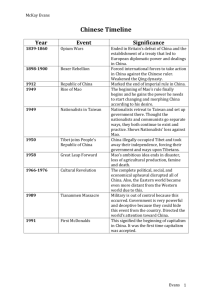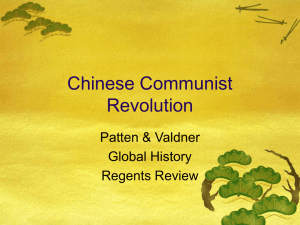China And Mao Zedong
advertisement
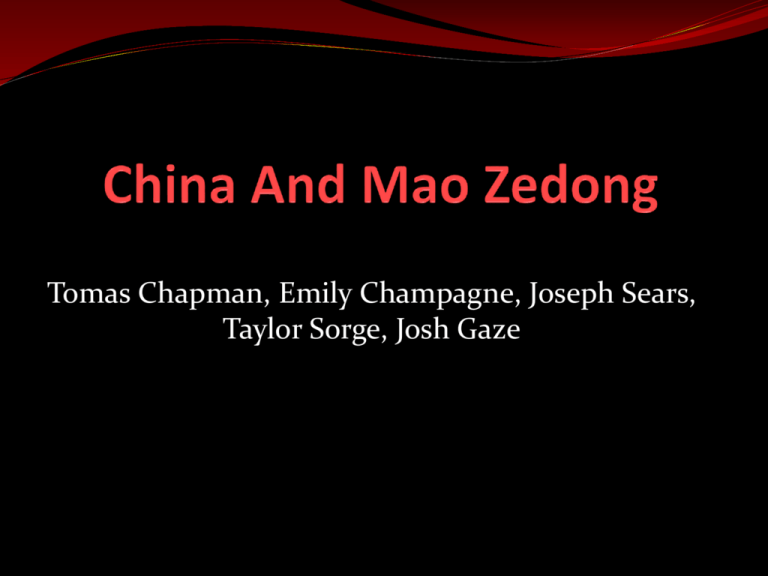
Tomas Chapman, Emily Champagne, Joseph Sears, Taylor Sorge, Josh Gaze Nationalists First great leader of the Kuomintang was Sun Yixian, which was a nationalist party. The nationalist party overthrew the last emperor of the Qing Dynasty. Sun yixian wanted to base government off of the “three principles of the people.” Nationalism-End to foreign control Peoples rights-Democracy Peoples livelihood-Economic security for all chinese Nationalists Cont. Sun Yixian lacked authority and military support to secure national unity. He turned over office to general Yuan Shikai, who then revolted the democratic ways of the revolution. In 1916, after the general died and civil war broke out, authority fell over to warlords and military leaders. Problems of WWI In 1917, Peiping (Beijing) declared war against Germany. Allied leaders gave Japan promised Chinese territories. The Treaty of Versailles creates rage in China On may 4th 1919 3,000 students gathered in the center Beijing. The demonstration they created spread to other cities created a national movement. Communist Party In 1921, Mao Zedong founded the Chinese communist party, based out of Shanghai. Mao Zedong believed that he could bring revolution to a real country where the peasants could be the true revolutionaries. Lenin and China While Mao Zedong was forming Chinese communism Sun Yixian and his Nationalist party, set up a government in South China. Sun Yixian decided to ally with the Kuomintang, who was a newly formed communism group. Lenin helped the Chinese nationalist government by sending military advisors and equipment to the nationalist in return for allowing the communist to join the Kuomintang. Jiang Jieshi When Sun Yixian died, he became the head of the Kuomintang. He feared the communist turning the country towards socialism. Promised Democracy and political rights. Government became less democratic and more corrupt. Civil War By 1930, Nationalist and communist were fighting a civil war. Mao Zedong recruited peasants to join his Red Army. The Nationalists attacked the Communists multiple times but failed to drive them away. Long March- Army of Jiangs men (700,000 men) surrounded Communists who faced defeat. While civil war went on, Japan invaded China. Civil War Pauses Japan watched as China weakened and took advantage of it. In 1937, Japanese invaded China with massive bombings and the killing of Chinese. This led to starvation of villages. By 1939, Japan had control of a large part of China. Nationalists and Communists came together to fight the Japanese. Mao Zedong Great Leap Forward This called for larger collective farms and 26,000 were created. It was actually a giant step backwards because it stopped industry growth. Red Guards Large group of students who pledged their devotion to Mao Zedong and the revolution they created. Eventually, Mao turned on them and were exiled, arrested, and executed. Cultural Revolution Cultural revolution- an uprising that the Red Guards created. The goal was to establish a society of peasants and workers where all were equal. Intellectual and artistic activity were considered useless and dangerous. Shut down schools and colleges In 1968, Mao said the revolution had to stop. WHAT HAVE WE LEARNED…? 1. What group of people composed the Kuomintang? a. Communist b. Nationalist c. Fascist 2. What infuriated China after the treaty of WWI? a. Germans invaded China b. China’s economy plummeted c. Chinese land was promised to Japan 3. The Chinese Capital was moved by? a. Mao Zedong c. The Treaty of Versailles b. Sun Yixian 4. Who invaded China and put the civil war on hold? a. Japan b. Russia c. Germany 5. Who were the Red Guards? a. A group of peasants b. a group of teenagers c. A group of nationalists 6. Who took over the rule after Sun Yixan? a. Mao Zedong b. Yuan Shikai c. Jiang Jieshi Short Answer Questions Describe the nationalist movement in china. Describe why the civil war in China temporarily paused. Explain what changes Jiang Jieshi brought to China. Answers Multiple Choice 1. b. 2. c. 3. a. 4. a. 5. b. 6. b. Answers Cont. Short Answer 1. Started off with Kuomintang When Jiang Jieshi took over, he went to civil war with Mao’s Red Army 2. Japan invaded China Nationalists and Communists joined together to fight Japan Answers Cont. Short Answer 3. Promised democracy Gave Chinese citizens civil rights
